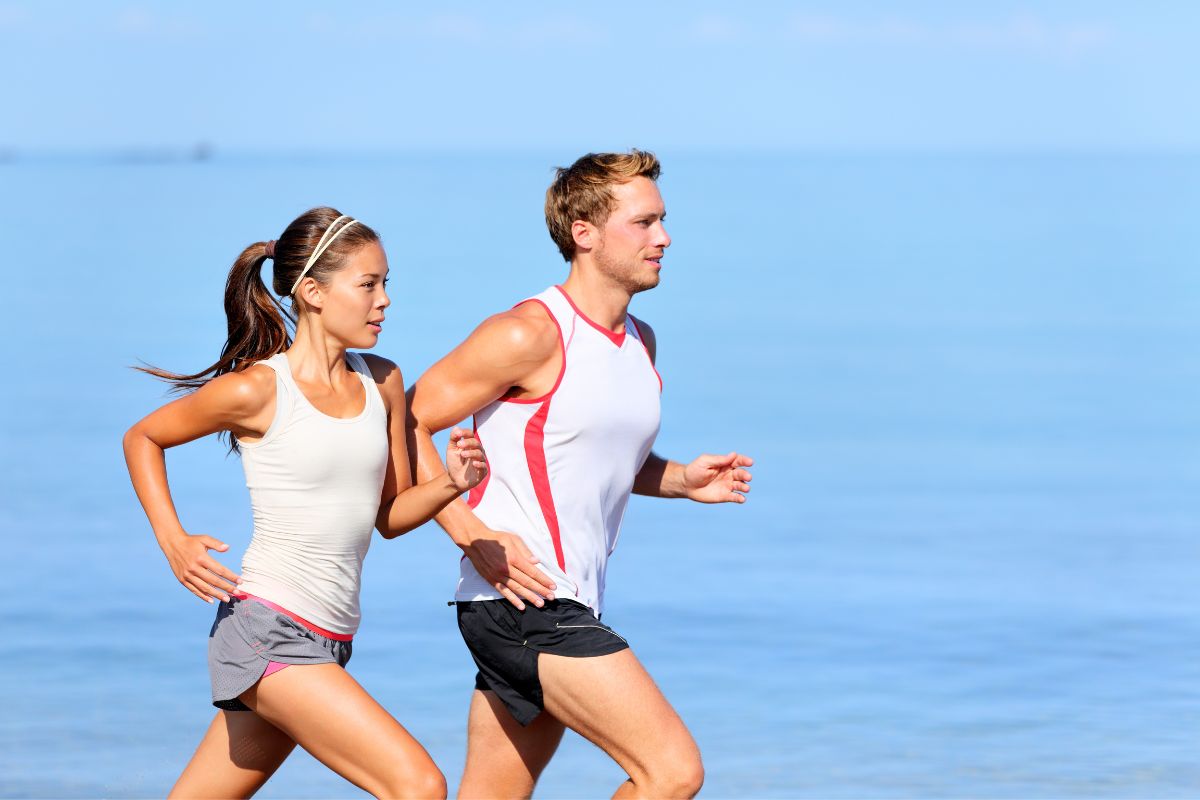What Should Vegan Athletes Eat? Tips for Thriving on Veganism for Athletes
Are you curious about how a plant-based diet could level up your athletic performance and elevate your overall health? This guide explores sports nutrition and how athletes can excel on a vegan, whole-food diet, minimizing processed foods and excessive supplements that could negate health benefits.
Packed with antioxidants, minerals, vitamins, and phytochemicals, vegan diets offer a treasure trove of health benefits. If you choose to eat more plant-based foods, it could lower your risk of heart disease, reduce “bad” cholesterol (LDL) and blood pressure, and decrease the likelihood of developing type 2 diabetes and certain cancers, making it a holistic approach to enhance your overall well-being.
Is a vegan diet safe for athletes? Absolutely. A strategic vegan diet, brimming with muscle-repairing proteins, fats that boost endurance, and high-quality carbohydrates for energy, covers the spectrum needed for athletic nutrition. For vegan athletes, fueling the body with the finest nutrients, including iron, zinc, calcium, vitamin B-12, and vitamin D, is imperative to prevent deficiencies. The secret? Increase your meal frequency and calorie intake with a variety of nutrient-dense foods to support peak performance, improve training, and speed up your recovery.
Essential Nutrients for Vegan Athletes
Protein
Protein plays a pivotal role in muscle repair, strength, and endurance, making it a critical component for any athlete’s success. Despite common misconceptions, vegan athletes don’t require more protein than their non-vegan peers. Rather, the emphasis is on regularly consuming a diverse array of high-quality plant-based protein sources, rich in essential amino acids, to promote sustained energy levels, optimal performance, and fast recovery.
Plant-Based Foods Rich in Protein:
- All Beans and Legumes
- Black beans
- Kidney beans
- Pinto beans
- Lentils
- Chickpeas
- Organic Soy Products
- Tofu
- Tempeh
- Seeds and Nuts
- Hemp
- Almonds
- Organic Whole Grains
- Oats
- Quinoa
For active plant-based athletes, aim for 1.0-1.7 grams of protein per kilogram of body weight daily through a diverse range of sources. For a delightful post-workout boost, try our Carob Berry Protein Smoothie recipe.
Iron
Iron is another crucial nutrient for athletes, vital for oxygen transport, energy metabolism, endurance, and strength. Like protein, vegan athletes can meet their iron needs through plant-based sources without resorting to animal products. Many of the same foods that are rich in protein are also a great source of iron.
Plant-Based Foods Rich in Iron:
- Beans and Legumes
- Lentils
- Soybeans
- Seeds
- Pumpkin Seeds
- Sesame Seeds
- Organic Whole Grains
- Oats
- Vegetables, especially green vegetables
- Spinach
- Swiss Chard
- Fruits
- Dried Apricots
Athletes often need more iron due to the increased demand for oxygen transport to muscles. Considering menstrual losses, female athletes may need up to 30 mg of iron daily, in contrast to 10 mg for male athletes. For a wholesome iron-rich meal, enjoy our delicious Italian-Style Lentils and Rice.
Zinc
Zinc supports immune function, cell growth, and repair, all critical for maintaining top athletic performance. Vegan athletes can easily meet their zinc requirements with a variety of plant-based foods available. Seeds are a particularly great source of zinc.
Plant-Based Foods Rich in Zinc:
- Beans and Legumes
- Lentils
- Chickpeas
- Soy Products
- Tofu
- Seeds and Nuts
- Pumpkin seeds
- Hemp seeds
- Cashews
- Sunflower seeds
- Quinoa
- Flaxseeds
- Chia seeds
- Wheat Germ
Male athletes may require up to 12-13 mg of zinc daily, whereas female athletes generally need around 9-10 mg. Delve into our Moroccan Chickpea Stew for a satisfying zinc-packed meal.
Calcium
Calcium is key for bone health and muscle function, making it indispensable for athletes. Vegan sources like leafy greens and fortified products make it easy to integrate into meals.
Plant-Based Foods Rich in Calcium:
- Seeds and Nuts
- Sesame Seeds
- Vegetables
- Kale
- Pak choi
- Broccoli
- Collard Greens
- Edamame
- Fruits
- Dried figs
- Fortified Foods
- Plant milks and yogurts
- Oranges and Orange Juice
- Cereal grains
The recommended dietary allowance of calcium is up to 1000 mg per day for women and men aged 19-50, and up to 1200 mg per day for women over 50 and men over 70. Savor our Kale-Pineapple Green Smoothie for a refreshing calcium boost.
Vitamin D
Vitamin D enhances calcium absorption, bone health, and immune function, making it vital for athletes. Sunshine is the natural source of vitamin D. During the winter months the sunshine isn’t direct enough to synthesize vitamin D in our skin, so supplements are very helpful. Food sources help a little as well, but generally, unfortified foods don’t have very high amounts of vitamin D in them. Vitamin D works with calcium to form a foundation for any athletic endeavor, supporting strong bones and optimal muscle function, ensuring you’re always ready to perform at your best.
Plant-Based Sources of Vitamin D:
- Fortified Foods
- Plant milks
- Mushrooms
The official recommended intake for adults is 600-800 IU/day, but athletes may benefit from 2000 IU/day to support muscle recovery. It is quite likely that you need even more than 2,000 IU/day, as many adults do need more. Testing your 25(OH)D (25-hydroxy vitamin D) levels is the only way to ensure that your vitamin D intake matches your needs. Optimal levels should be 50-80 ng/ml of 25(OH)D. Try our Mushroom Soup for a nutritious meal that has some natural vitamin D in it.
Healthy Omega 3 Fats
While often overlooked, essential fatty acids like Omega-3s, EPA, and DHA are vital for heart health, inflammation control, and brain function. Incorporating these into your diet ensures that both your body and mind remain in peak condition, supporting your health and cognitive functions as you train and compete.
Plant-based omega 3 fats provide alpha-linolenic acid (ALA), which can be elongated to EPA. But our bodies work best with DHA as well, which must be obtained directly as DHA. So, at Hallelujah Diet we recommend supplementing with pure, contaminant-free fish oil as a source of EPA and DHA. Eat walnuts, flaxseeds, and chia seeds as whole foods for the benefits of everything in the seeds including the ALA. Then take pure, contaminant-free fish oil for the EPA and DHA.
Plant-Based Sources of Healthy Omega-3 Fats:
- Seeds and Nuts
- Flaxseeds
- Chia seeds
- Walnuts
Ensure that healthy fats account for 20-35% of your total daily caloric intake. Elevate your salad experience with Ruth’s Favorite Salad Dressing to meet your fatty acid needs.
Carbohydrates
Carbohydrates are the primary energy source for athletes, fueling workouts and aiding swift recovery. From whole grains to starchy vegetables, a vegan diet is naturally rich in high-quality carbs.
Plant-Based Foods Rich in Carbohydrates:
- Beans and Legumes
- Black beans
- Kidney beans
- Chickpeas
- Lentils
- Organic Grains
- Brown rice
- Barley
- Wheat berries
- Oats
- Quinoa
- Millet
- Tubers and Root Vegetables
- Sweet potatoes
- Carrots
- Beets
For athletes, the recommended carbohydrate intake varies from 3-13 grams per kilogram of body weight daily, tailored to the intensity and duration of the exercise. Try Lois’ Raw Sweet Potato for an energizing option.
Keep in mind that these recommendations serve as general guidelines, and actual needs may differ based on individual factors. It's essential to consult a healthcare professional to determine the intake levels that are right for you.
Suggested Supplements
While a whole-food, plant-based diet covers most of your nutritional bases, certain supplements can enhance your athletic performance and overall health.
Vitamin B12
Critical for nerve function and energy production, B12 isn't naturally found in plant foods. While B12-fortified plant-based foods exist, a supplement can guarantee you meet your daily requirements without compromise, ensuring your body’s nerve and energy systems function at their best.
Magnesium
This vital mineral aids in muscle relaxation, energy production, and the synthesis of protein. Magnesium can be found in foods like spinach, nuts, and whole grains, but for athletes with strenuous training programs, additional supplementation can be beneficial. It supports everything from improving sleep to facilitating muscle recovery.
Vitamin D3 / K2
A key player in bone health and immune function, Vitamin D3 is primarily synthesized through sun exposure. It enhances calcium absorption, crucial for maintaining bone density and strength. For those in less sunny locales or during darker months, a Vitamin D supplement can help maintain these vital functions. Vitamin D works synergistically with vitamin K2. Vitamin D opens the gate wide to let calcium in, and vitamin K2 directs the traffic so that calcium goes to the right places. Having too much calcium in the wrong place is very unhelpful. Vitamin K2 ensures that calcium is deposited in hard tissues like bone and not in soft tissues like walls of arteries, veins, and cartilage. Vitamin K2 is available in high amounts from natto, but it is a traditional Japanese food, and you need an acquired taste to eat natto. So, the best vitamin D3 supplements also contain vitamin K2.
Omega-3 Fatty Acids (DHA and EPA)
Omega 3 fats are beneficial to heart health, brain function, and managing inflammation. As mentioned above, vegans can obtain ALA from plant-based sources like flaxseeds, chia seeds, and walnuts, but these plant sources do not provide any DHA. For an extra boost, pure, contaminant-free fish oil offers a reliable source of DHA and EPA, allowing you to fully reap the benefits associated with omega-3 fatty acids.
By incorporating these supplements, you can address potential gaps in a vegan diet, ensuring you remain at the top of your game. Select high-quality supplements and consult with a healthcare professional to help tailor your intake to your individual needs.
Conclusion
By focusing on a diet rich in proteins, iron, zinc, calcium, vitamin D, healthy omega-3 fats, and carbohydrates, vegan athletes can meet their nutritional needs, avoiding heavily processed foods or excessive supplements whenever possible. A commitment to a variety of whole, plant-based foods and mindful supplementation guarantees superior athletic performance and prime health. Unlock the incredible potential of plant-based nutrition and watch your athletic journey reach new peaks.






